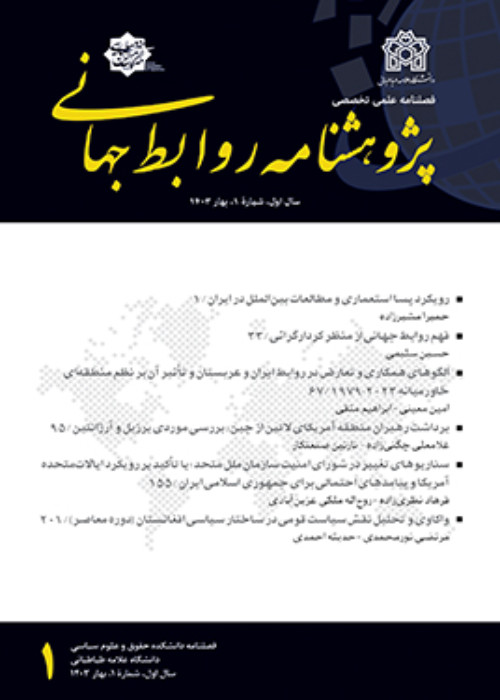The Impact of the "Covid-19" Crisis on the Conceptualization of "Security" in International Relations
Author(s):
Article Type:
Research/Original Article (بدون رتبه معتبر)
Abstract:
Governments throughout history have been confronted with political and security problems related to diseases, as they are widespread and claim many lives. The virus COVID -19 became a global crisis in a short period of time due to its dynamic transmission and unknown nature. This situation challenged the economic structures of the world and created security problems at the level of relations between countries Therefore, using the descriptive and analytical method and based on the theory of the Copenhagen School and specifically the issue of security, this study attempts to answer the central question of what impact the Corona Crisis has had on the traditional concept of international security, and also to answer whether this will lead to a recognition of health issues as a non-traditional threat in the security priorities of countries and international organizations? And what will be the consequences of these changes? This study hypothesizes that the emergence of the recent crisis has accelerated the difference in the traditional conception of security, as the absence of military confrontation between national governments has led to a change in the role of health care issues in domestic and international security. On the other hand, the intertwining of health and security sectors during the outbreak of the Coronavirus has resulted in the mobilization of political will and the allocation of economic resources to address this issue. This can be seen as a positive step towards enhancing the overall level of health. Still, placing a strong emphasis on health security has adverse effects on internal democracy and international cooperation.After the recent experience of pandemics, there has been a strong emphasis on health and global health by theorists in this field. An article published 35 years ago (Thomas, 1989) addressed the issue of health and international relations by Carolyn Thomas. The article demonstrated how global health can play a pivotal role in this field. In addition, Susan Peterson, in her article titled "Pandemic Diseases and National Security," examines the economic, social, and political effects of pandemics on different countries and societies. She mentions that biological agents pose a serious threat to the security of countries (Peterson, 2002). Moreover, McInnis and Kelly Lee discussed the relationship between these three variables in their joint article titled "Health, Security, and Foreign Policy" while emphasizing health concerns. They believe that epidemic diseases pose a significant security threat because they can cross borders and weaken a nation's economy and internal stability. They should give more attention to national security policies.In this article, we aim to explore the impact of the COVID-19 pandemic on the political, economic, and military domains of countries. Additionally, we aim to discuss the significance of reassessing the conventional notion of security and integrating health concerns into the framework of the Copenhagen school's security theory. Furthermore, we aim to address the potential consequences of securitizing health issues on international peace and security. Through an examination of the effects of the COVID-19 crisis, we aim to test the hypothesis that prioritizing security will foster political resolve and allocate economic resources to this sector.However, overdoing it brings countless ill effects and not only will not lead to progress in the field of health and health, but may also overshadow the process of internal democracy and international security.In this regard, dealing with the epidemic of Covid-19 under the title of a security issue can have two different consequences: firstly, by revising the traditional concepts of security, it will increase the importance of governments and international organizations to health affairs. In this way, the amount of attention of countries to their healthcare infrastructure as a security investment increases.Excessive measures in addressing the aforementioned matter can lead to numerous adverse consequences. It is important to note that such actions not only hinder advancements in the realm of healthcare but also have the potential to overshadow the development of internal democracy and international security. Consequently, treating the epidemic as a security concern can lead to two distinct outcomes. Firstly, reevaluating traditional concepts of security will enhance the importance of governments and international organizations in relation to health matters. Consequently, nations are increasingly recognizing the importance of allocating resources to enhance their healthcare infrastructure as a way to ensure security.
Keywords:
Language:
Persian
Published:
Journal of Research on Global Relations, Volume:1 Issue: 2, 2024
Pages:
175 to 201
magiran.com/p2682805
دانلود و مطالعه متن این مقاله با یکی از روشهای زیر امکان پذیر است:
اشتراک شخصی
با عضویت و پرداخت آنلاین حق اشتراک یکساله به مبلغ 1,390,000ريال میتوانید 70 عنوان مطلب دانلود کنید!
اشتراک سازمانی
به کتابخانه دانشگاه یا محل کار خود پیشنهاد کنید تا اشتراک سازمانی این پایگاه را برای دسترسی نامحدود همه کاربران به متن مطالب تهیه نمایند!
توجه!
- حق عضویت دریافتی صرف حمایت از نشریات عضو و نگهداری، تکمیل و توسعه مگیران میشود.
- پرداخت حق اشتراک و دانلود مقالات اجازه بازنشر آن در سایر رسانههای چاپی و دیجیتال را به کاربر نمیدهد.
In order to view content subscription is required
Personal subscription
Subscribe magiran.com for 70 € euros via PayPal and download 70 articles during a year.
Organization subscription
Please contact us to subscribe your university or library for unlimited access!


